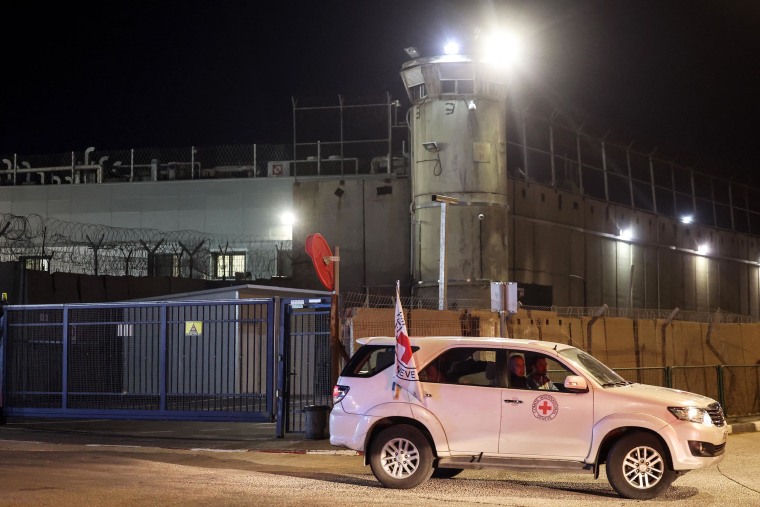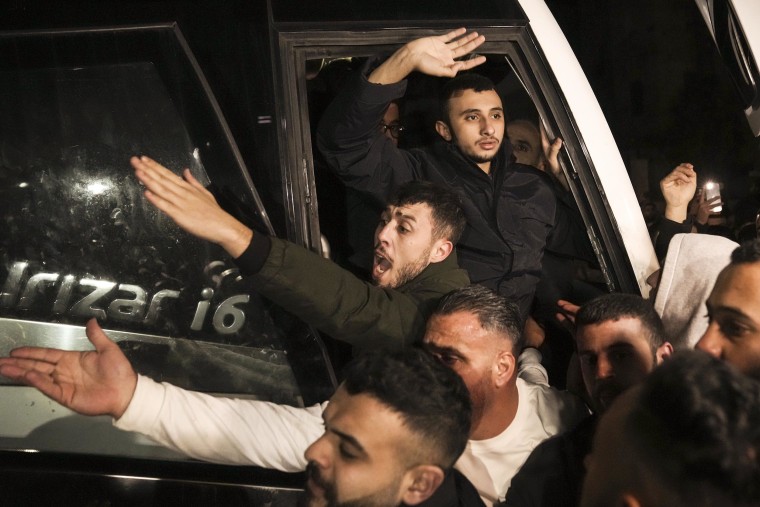RAMALLAH, West Bank — The occasional volley of tear gas did little to dampen the celebratory mood outside Ofer Prison in the occupied West Bank as crowds gathered to greet the first group of Palestinian prisoners to be released in the temporary truce agreement between Israel and Hamas.
Among them was Abed Khatib, whose 17-year-old son, Iyas, was set to be released Friday. He says Israeli security forces raided his home one night in February and took his son away with no explanation.
“My son was a student in high school, getting ready for university,” he said. “Until now, I don’t know what he’s accused of doing.”
In the lead-up to the temporary truce in the war in Gaza that broke out after Hamas launched its Oct. 7 terror attack, killing 1,200 people and kidnapping 240, the Israeli government approved a list of 300 Palestinian prisoners eligible for release.
According to an NBC News analysis of the list, about 20% of them were convicted of crimes, the most serious of which is attempted murder. One woman released as part of the deal, for example, was imprisoned for stabbing an Israeli soldier in the back in 2015, when she was 22 years old. The list indicates that others were detained for offenses such as supporting terrorism, trespassing, belonging to an illegal organization, throwing incendiary devices and stones and carrying, possessing and manufacturing weapons, among others.
Roughly 80% of those on the list were not convicted of any crimes. They were either charged with crimes that had not yet been prosecuted, or were detained under a practice known as administrative detention, whereby Israel holds Palestinians in the occupied territories with no formal charges or evidence presented against them.
Khatib says his son was held under administrative detention.

Israeli, Palestinian and international human rights organizations have long condemned the practice of administrative detention, particularly when applied to children. And Palestinians in the West Bank describe it as one of many oppressive and humiliating aspects of life under military occupation.
“Israel is a country that routinely grabs kids and throws them in prison, with the ability to keep them there indefinitely without charge or trial,” said Diana Buttu, a lawyer and former adviser to the Palestine Liberation Organization.
Administrative detention is meant to deal with “domestic threats posed by individuals present in the West Bank, where alternative measures (including criminal proceedings) are unavailable,” two IDF lawyers wrote in a 2018 paper in the Journal of National Security Law and Policy, a peer-reviewed publication co-published by Georgetown Law and Syracuse University.
These detention orders are issued by Israel’s West Bank military commander, reviewed by prosecutors, and technically cannot exceed six months, the IDF paper said, although this period can be — and often is — renewed indefinitely, according to B’Tselem and other human rights groups.
“The authorities must make their decisions based on ‘clear, especially reliable and convincing’ evidentiary material,” the paper said, citing an Israeli court ruling from 2009. “A person may only be detained where there is near certainty that serious harm would be caused to state or public security unless that person is detained.”
The United Nations has said that according to international law, administrative detention can be used “only in emergencies, and only if a fair hearing can be provided where the detainee can challenge the allegations.” Michael Lynk, its previous special rapporteur for the Palestinian territories, said in 2020 it was “an anathema in any democratic society that follows the rule of law.”
However, the IDF lawyers wrote that Israel’s policies do “comply” with international law, which, they said, “does not prohibit administrative detention on security grounds” but says only that it “cannot be imposed arbitrarily and must be based on grounds and procedures established by law.”
Israel’s use of administrative detention was increasing even before Hamas’ attack Oct. 7, according to data compiled by the Israeli human rights organization B’Tselem: In September, Israel was holding approximately 1,310 Palestinians in administrative detention, of whom just 23 were minors, according to the organization, which compiles its reports from data provided by the Israel Prison Service.

Human rights organizations also criticize the fact that the practice of administrative detention applies only to Palestinians living in the West Bank — which much of the world, including the U.S., has considered illegally occupied since the 1967 Arab–Israeli War — and not to Jewish settlers or other Israeli citizens.
“This is two systems, two ways of treating people,” said Shawan Jabarin, executive director of Al-Haq, a human rights organization based in Ramallah.
When asked about the practice of placing minors and other Palestinians in administrative detention without charge or trial, an Israel Prison Service spokesperson responded in a statement that “all prisoners in IPS custody are detained according to the provisions of the law.”
The statement added: “All prisoners and detainees have the right to file a complaint, which will be fully examined by official authorities. We are not aware of the claims raised here and therefore cannot specifically relate to them.”
Even after being released, some prisoners and their families say they feel under Israeli control.
In the days leading up to the prisoner release, Israeli National Security Minister Itamar Ben-Gvir warned Palestinians that they were prohibited from publicly celebrating the release of the prisoners.
According to Al-Haq and the Palestinian Prisoners Club, an organization in the West Bank that represents prisoners, those released as part of the agreement were told by Israeli authorities that they would face a fine of 70,000 shekels, or roughly $18,000, if they celebrated publicly or spoke to the media.
When asked about this, the Israel Prison Service did not respond.
At his home in Hizma, near Jerusalem, Khatib said his family was thrilled to welcome Iyas back after nine months in detention.
The family home is on a hill with clear views of Neve Yaakov, an Israeli settlement. A group of Israeli soldiers sat in the shade under an olive tree nearby.
Iyas himself declined to speak, afraid of retaliation by Israeli authorities.
“We are not allowed to say anything,” he said.